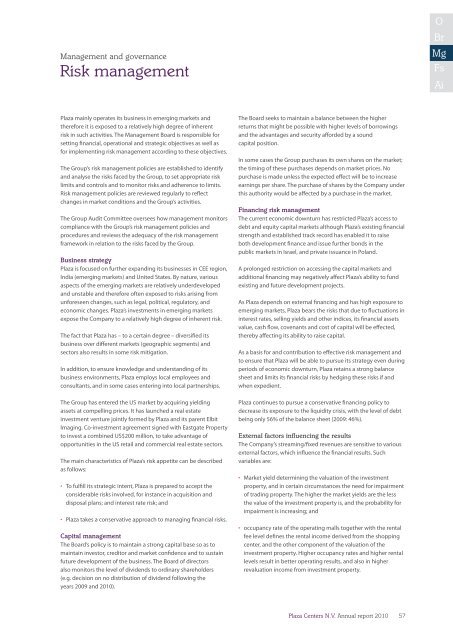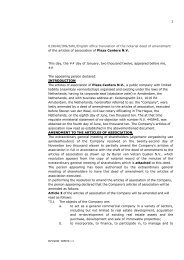Annual report 2010 - plazacenters
Annual report 2010 - plazacenters
Annual report 2010 - plazacenters
You also want an ePaper? Increase the reach of your titles
YUMPU automatically turns print PDFs into web optimized ePapers that Google loves.
Management and governance<br />
Risk management<br />
O<br />
Br<br />
Mg<br />
Fs<br />
Ai<br />
Plaza mainly operates its business in emerging markets and<br />
therefore it is exposed to a relatively high degree of inherent<br />
risk in such activities. The Management Board is responsible for<br />
setting financial, operational and strategic objectives as well as<br />
for implementing risk management according to these objectives.<br />
The Group’s risk management policies are established to identify<br />
and analyse the risks faced by the Group, to set appropriate risk<br />
limits and controls and to monitor risks and adherence to limits.<br />
Risk management policies are reviewed regularly to reflect<br />
changes in market conditions and the Group’s activities.<br />
The Group Audit Committee oversees how management monitors<br />
compliance with the Group’s risk management policies and<br />
procedures and reviews the adequacy of the risk management<br />
framework in relation to the risks faced by the Group.<br />
Business strategy<br />
Plaza is focused on further expanding its businesses in CEE region,<br />
India (emerging markets) and United States. By nature, various<br />
aspects of the emerging markets are relatively underdeveloped<br />
and unstable and therefore often exposed to risks arising from<br />
unforeseen changes, such as legal, political, regulatory, and<br />
economic changes. Plaza’s investments in emerging markets<br />
expose the Company to a relatively high degree of inherent risk.<br />
The fact that Plaza has – to a certain degree – diversified its<br />
business over different markets (geographic segments) and<br />
sectors also results in some risk mitigation.<br />
In addition, to ensure knowledge and understanding of its<br />
business environments, Plaza employs local employees and<br />
consultants, and in some cases entering into local partnerships.<br />
The Group has entered the US market by acquiring yielding<br />
assets at compelling prices. It has launched a real estate<br />
investment venture jointly formed by Plaza and its parent Elbit<br />
Imaging. Co-investment agreement signed with Eastgate Property<br />
to invest a combined US$200 million, to take advantage of<br />
opportunities in the US retail and commercial real estate sectors.<br />
The main characteristics of Plaza’s risk appetite can be described<br />
as follows:<br />
• To fulfill its strategic intent, Plaza is prepared to accept the<br />
considerable risks involved, for instance in acquisition and<br />
disposal plans; and interest rate risk; and<br />
• Plaza takes a conservative approach to managing financial risks.<br />
Capital management<br />
The Board’s policy is to maintain a strong capital base so as to<br />
maintain investor, creditor and market confidence and to sustain<br />
future development of the business. The Board of directors<br />
also monitors the level of dividends to ordinary shareholders<br />
(e.g. decision on no distribution of dividend following the<br />
years 2009 and <strong>2010</strong>).<br />
The Board seeks to maintain a balance between the higher<br />
returns that might be possible with higher levels of borrowings<br />
and the advantages and security afforded by a sound<br />
capital position.<br />
In some cases the Group purchases its own shares on the market;<br />
the timing of these purchases depends on market prices. No<br />
purchase is made unless the expected effect will be to increase<br />
earnings per share. The purchase of shares by the Company under<br />
this authority would be affected by a purchase in the market.<br />
Financing risk management<br />
The current economic downturn has restricted Plaza’s access to<br />
debt and equity capital markets although Plaza’s existing financial<br />
strength and established track record has enabled it to raise<br />
both development finance and issue further bonds in the<br />
public markets in Israel, and private issuance in Poland.<br />
A prolonged restriction on accessing the capital markets and<br />
additional financing may negatively affect Plaza’s ability to fund<br />
existing and future development projects.<br />
As Plaza depends on external financing and has high exposure to<br />
emerging markets, Plaza bears the risks that due to fluctuations in<br />
interest rates, selling yields and other indices, its financial assets<br />
value, cash flow, covenants and cost of capital will be effected,<br />
thereby affecting its ability to raise capital.<br />
As a basis for and contribution to effective risk management and<br />
to ensure that Plaza will be able to pursue its strategy even during<br />
periods of economic downturn, Plaza retains a strong balance<br />
sheet and limits its financial risks by hedging these risks if and<br />
when expedient.<br />
Plaza continues to pursue a conservative financing policy to<br />
decrease its exposure to the liquidity crisis, with the level of debt<br />
being only 56% of the balance sheet (2009: 46%).<br />
External factors influencing the results<br />
The Company’s streaming/fixed revenues are sensitive to various<br />
external factors, which influence the financial results. Such<br />
variables are:<br />
• Market yield determining the valuation of the investment<br />
property, and in certain circumstances the need for impairment<br />
of trading property. The higher the market yields are the less<br />
the value of the investment property is, and the probability for<br />
impairment is increasing; and<br />
• occupancy rate of the operating malls together with the rental<br />
fee level defines the rental income derived from the shopping<br />
center, and the other component of the valuation of the<br />
investment property. Higher occupancy rates and higher rental<br />
levels result in better operating results, and also in higher<br />
revaluation income from investment property.<br />
<br />
Plaza Centers N.V. <strong>Annual</strong> <strong>report</strong> <strong>2010</strong>57








